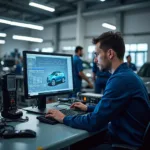Car servicing is a crucial aspect of car ownership, ensuring your vehicle’s longevity, performance, and safety. Understanding What All Is Done In Car Servicing empowers you to make informed decisions about your vehicle’s maintenance. This comprehensive guide will delve into the details of car servicing, covering everything from routine checks to more complex procedures. We’ll explore why regular car servicing is essential and what you can expect during a typical service appointment.
Maintaining your car through regular servicing is like giving it a health check-up. It allows mechanics to identify and address potential issues before they escalate into costly repairs. Scheduled servicing also contributes to better fuel efficiency, improved performance, and a safer driving experience. You can find more useful information on car servicing at what to check in car service.
Routine Checks During Car Servicing
A standard car service includes a series of checks and replacements designed to keep your car running smoothly. These checks typically cover essential components like the engine, brakes, tires, and fluids.
- Fluid Level Checks: Engine oil, coolant, brake fluid, power steering fluid, and windshield washer fluid levels are inspected and topped off as needed.
- Tire Inspection: Tire pressure, tread depth, and overall condition are assessed to ensure safe and efficient driving.
- Brake Inspection: Brake pads, rotors, and lines are examined for wear and tear, ensuring optimal braking performance.
- Engine Inspection: Checking for leaks, unusual noises, and performance issues.
- Lights and Electrical System Check: Ensuring all lights, indicators, and electrical components function correctly.
Component Replacements in Car Servicing
Beyond the routine checks, car servicing often involves replacing specific components based on the manufacturer’s recommendations or the car’s condition. These replacements are essential for maintaining the vehicle’s reliability and performance.
- Oil and Filter Change: Regular oil changes are vital for lubricating the engine and preventing premature wear.
- Air Filter Replacement: A clean air filter ensures optimal airflow to the engine, improving fuel efficiency and performance.
- Spark Plug Replacement: Worn-out spark plugs can lead to reduced fuel economy and engine misfires.
- Cabin Air Filter Replacement: This filter cleans the air entering the cabin, improving air quality and comfort.
Advanced Car Servicing Procedures
For more comprehensive car servicing, advanced procedures may be necessary depending on the vehicle’s age, mileage, and specific needs.
- Transmission Service: This involves flushing the transmission fluid and replacing the filter to ensure smooth gear shifting.
- Coolant System Flush: Removing old coolant and replacing it with fresh coolant prevents corrosion and overheating.
- Brake Fluid Flush: This procedure replaces old brake fluid, maintaining optimal braking performance and preventing brake failure.
- Fuel System Cleaning: Cleaning the fuel injectors and fuel lines can improve fuel efficiency and engine performance.
Do you need help figuring out where to get your Fiat serviced? Check out can fiat cars be serviced anywhere. Understanding the specific needs of your car model can be crucial for effective servicing.
What to Expect During a Car Service Appointment
When you bring your car in for servicing, you can expect a systematic process designed to address all necessary maintenance tasks.
- Vehicle Inspection: A mechanic will thoroughly inspect your car, noting any existing or potential issues.
- Service Recommendation: Based on the inspection, the mechanic will recommend the appropriate service package or specific repairs.
- Service Execution: The mechanic will carry out the recommended service, including routine checks, component replacements, and any necessary repairs.
- Quality Control: After the service, a final inspection ensures that all work has been completed correctly.
- Service Report: You’ll receive a detailed report outlining the services performed, any parts replaced, and recommendations for future maintenance.
Knowing what things i need to buy to service my car can also be helpful in preparing for your service appointment.
Conclusion
Understanding what all is done in car servicing is vital for responsible car ownership. Regular car servicing ensures your vehicle’s safety, reliability, and optimal performance. By staying informed about the various aspects of car servicing, you can make informed decisions and keep your car in top condition for years to come. You might also find the information on how car servicing is done in india interesting to compare different service approaches.
FAQ
- How often should I service my car? Consult your car’s owner’s manual for the recommended service intervals.
- What is the difference between a minor and major service? A minor service typically includes routine checks and basic replacements, while a major service is more comprehensive and involves more extensive checks and replacements.
- Can I service my car myself? While some basic maintenance tasks can be done at home, it’s recommended to have your car serviced by a qualified mechanic for more complex procedures.
- How much does car servicing cost? The cost of car servicing varies depending on the type of service, the make and model of your car, and the location of the service center.
- What are the benefits of regular car servicing? Regular car servicing ensures your vehicle’s safety, reliability, and optimal performance, preventing costly repairs in the long run.
- What should I look for in a car service center? Choose a reputable service center with qualified mechanics and a good track record.
- How can I prepare my car for servicing? Ensure your car is clean and remove any personal belongings.
Need help with car diagnostics or servicing?
Contact us via WhatsApp: +1(641)206-8880 or Email: [email protected]. Our 24/7 customer support team is ready to assist you.

